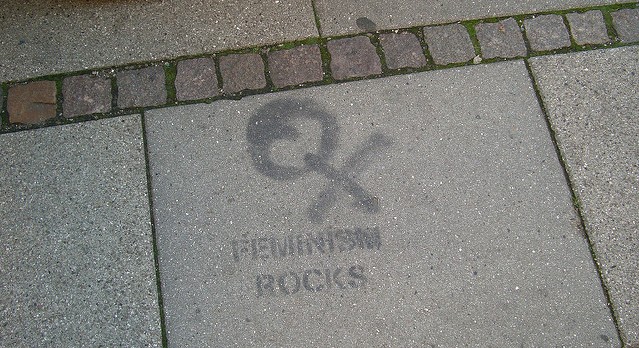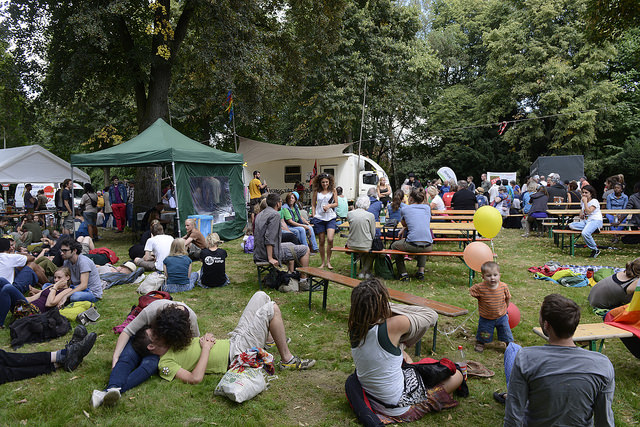No one really told us what organizing a degrowth conference would entail. We simply knew we wanted to do it. Two years of organizing, meeting, discussing and struggling have passed and now we’re less than seven weeks away from the first day of the conference. The initial motivation we all had in the summer of 2018 has not gone, but it has faltered at times. There have been days when I would have happily not attended another working group meeting, plan another plenary, or moderate another organizers event. But then I see the stained glass snail in our window, that was coincidentally there when we moved into the office, and I smile – knowing that the stress, exhaustion and endless meetings are worth it. Part 1: Before the crisis Becoming a wedding planner A past degrowth conference organizer told me that a conference is like a wedding: you’re putting on an event to gather the community and orchestrate an important group ritual. In other words, the physical gathering of the community is the main goal, and all else is secondary, including our hopes of the degrowth movement reflecting on the role of strategy. I was stunned. I had unknowingly signed up to be a wedding planner. Would I have chosen to be involved if I had known this from the beginning? This, in my opinion, is the dual challenge of organizing a degrowth conference: balancing what needs to happen (a big event, with food, logistics, a schedule, etc.) and what you want to happen (to create a space for the movement to reflect on strategies to bring about a degrowth transformation). Interestingly, the former can in fact be considered a strategy in itself. A significant degrowth event in Vienna that is well organized, involving relevant institutions and new groups from the public has the potential to shift the perception of degrowth in the city and broaden its alliances. However, there is a tendency for this logistical challenge and the content of the conference to compete for attention in the organizing process.. We are doing our best to harmonize both goals, making the conference itself a strategy for advancing degrowth as a movement, and ensuring that we don’t lose sight of the original purpose of the conference: to encourage degrowth to address its ambiguity around the importance of strategy in the movement. Thus, the requirement of a wedding planner. How degrowth should a degrowth conference be? Another interesting dilemma of organizing a degrowth conference is, how degrowth should it be? And who defines what the degrowth way of conference organizing entails? Should we use social media to promote the event? All vegan or just vegetarian catering? Paid organizers or all volunteers? Are organizations x,y,and z really degrowth-y enough? Can we plead against flying to the conference or is this exclusionary towards those travelling longer distances, such as would-be attendees from the Global South? Thus, organizing a degrowth conference is not just a practical exercise. Importantly - and we should have realized this sooner - it is also a manifestation of ideas. It represents how we collectively understand degrowth and relatedly, how we understand the conference’s role in the wider degrowth movement. Is the conference just a gathering for the degrowth community, or a chance to expand the reach of degrowth in Vienna, or both? You’ll have to attend the event to find out for yourself! A conference’s potential A lot of work has gone into the conference and still a lot more needs to be done. I sometimes think about how much time and energy will have gone into an event that will be over in just four days, but such thoughts can be dangerous. The conference is compelled by its own inertia: it will and it must be organized. There is an exciting potential of the conference to change economic discourses in Vienna, impact the degrowth movement’s understanding of strategy, and connect many volunteers and participants to degrowth for the first time. While these possibilities cannot be seen or measured, they exist, and reflect the organizing team’s wishes for the conference to have meaning and impact beyond the four-day event itself. That will be our next task: considering how to develop the conference’s outcomes and continue building on our efforts going forward. But first – we have a conference to organize! Hopefully, this piece can give future prospective organizers a glimpse into what organizing a degrowth conference will entail, before they start. It is not meant to dissuade but rather to illustrate the challenges and also the potential of what a group of radical wedding planners can do. Part 2: Degrowth organizing amidst a pandemic I began writing this piece before the crisis of covid-19 swept across Europe. Now, everything has changed. We thought degrowth organizing in a non-degrowth world was challenging enough as it was. Little did we know, an inconceivably larger obstacle was heading our way. I will explain here how the conference organizing team has been dealing with this challenge and our decision to transition the conference to an online format. Zoom rooms, online retreats, discussing server capacities, and comparing video/audio compression abilities of different communication tools: that’s the new normal. After a difficult decision-making process, the Degrowth Vienna 2020: Strategies for Social-Ecological Transformation conference decided to transition to an online-format, due to Covid-19 event restrictions. The organizing team is still processing the loss of so much of the work we have done over the last 2 years, much of which cannot be re-purposed for an online event. Caring for each other Again, we face the dual challenge of the practical necessities of organizing an online conference, which is totally new to most of us, and the important care work of looking after each other in this challenging time. Already a few members of the organizing team have stepped back. Some aren’t motivated to organize an online conference in the same way that an in-person conference excited them. Others in the team have voiced the challenges of organizing online, which often leave little space for emotional sharing or the chance to have informal discussions over coffee. Lastly, most of us feel dismayed at the fact that so much of the work we have done over the past two years is simply no longer relevant. We are doing our best to proactively create the spaces for emotional sharing and caring amongst the organizing team. To highlight the work done by everyone in the team (especially that which may be forgotten in an online conference), and show appreciation for each other’s work, which is especially important in a time of crisis when people are going through additional stress or challenges (health, financial, etc.). The ComCare (communications & care) team deserves a special shout-out for their ongoing work in this regard. Despite the huge challenges posed by covid-19, the organizing team is in many ways stronger than ever. We faced a crisis collectively, found a solution and are working together to organize the first ever online degrowth conference! It is clear to me that it is precisely because we have had two long years of organizing together that we were resilient enough to make such a transition. This is reflected in the multiple independent working groups that are functioning so well despite having to meet only digitally, and in the trust we have fostered amongst each other that allows for open emotional exchange even in front of our computer screens, and in the motivation to continue organizing after the online conference together: stay tuned for more info about our post-corona Vienna degrowth meet-up! Why not postpone? The Vienna organizing team decided to move our conference online both for the movement and for ourselves. From the movement perspective, we feel that a reflection on strategy in the degrowth movement is needed now more than ever, and that the conference will provide an important space to reflect on the covid-19 crisis and discuss ways forward. Organizing towards a degrowth transformation is especially challenging in this moment of crisis, but that makes a strategy focused conference even more valuable. From the organizers perspective, frankly, many of us are exhausted from two years of thinking about this conference, scheduling meetings, attending meetings, and cannot conceive of further postponing the chance to finally see some fruits of our labor, even if not in the form we originally envisaged. Furthermore, postponing the conference would mean organizing in-limbo for another 6 months, which seems an imperfect option at best in such uncertain times as these. Additionally, as mentioned above, financial factors also shape our decisions, and most of our fundraising is tied to 2020. Organizing in a time of corona While online organizing has numerous shortcomings and challenges, it has also given me (and I hope many of my co-organizers) a clear sense of purpose in these chaotic times. Also, from a practical perspective, it has helped me structure my days - online meetings in the morning and afternoon, punctuated by long lunch breaks, refreshing walks and bike rides. The corona crisis has been much more challenging for many. We hope that this conference is one small step towards advancing the possibility of a degrowth future, where such crises (covid-19, climate, etc.) are not an inherent feature of our system, and that when they strike, the most vulnerable are not disproportionately affected. So, join our online conference, find out with us what it’s like to attend the first degrowth conference online, as we try our best to make it convivial, and work together to strategically organize for a degrowth future! For more information on the Vienna conference and its new format, visit: www.degrowthvienna2020.org

We are happy to announce a follow up to our roundtable about feminism(s) and degrowth at the Degrowth Conference in Budapest 2016. Sharing many common points, feminisms and degrowth have the potential to build an alliance which promotes mutual enrichment. One intersection is the criticism of the dominant socio-economic mode. By criticising the centrality of productive performance and by furt...

Impressions from the degrowth summer school and the Rhineland climate camp It's now for the second time that the Degrowth Summer School took place at the climate camp in the coal-mining region of the German Rhineland with around 800-900 participants. Last year it had mainly focused on the topic of climate justice and on bringing the two movements – degrowth and climate justice – together. This...
What does degrowth mean to you? By Marc Menningmann In this video, some of the scientists, activists and ordinary other participants who gathered at last year's Degrowth Conference in Leipzig share their personal understanding of degrowth. It shows how many different facets degrowth can have. Now we have added English subtitles to it which can be activated by clicking on the little green b...